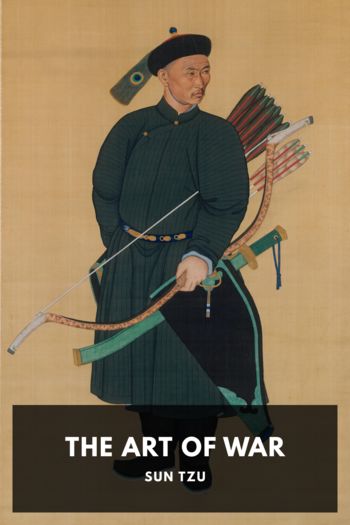The Art of War, Sun Tzu [best english books to read for beginners TXT] 📗

- Author: Sun Tzu
Book online «The Art of War, Sun Tzu [best english books to read for beginners TXT] 📗». Author Sun Tzu
The Tʽung Tien has the bad variant 便 for 變. With regard to the latter word, I believe I have hit off the right meaning, the whole phrase being slightly elliptical for “influencing the movements of the army through their senses of sight and hearing.” Li Chʽüan, Tu Mu and Chia Lin certainly seem to understand it thus. The other commentators, however, take 民 (or 人) as the enemy, and 變 as equivalent to 變惑 or 變亂 “to perplex” or “confound.” This does not agree so well with what has gone before, though on the other hand it renders the transition to the next paragraph less abrupt. The whole question, I think, hinges on the alternative readings 民 and 人. The latter would almost certainly denote the enemy. Chʽên Hao alludes to 李光弼 Li Kuang-pi’s night ride to 河陽 Ho-yang at the head of 500 mounted men; they made such an imposing display with torches, that though the rebel leader 史思明 Shih Ssǔ-ming had a large army, he did not dare to dispute their passage. (Chʽên Hao gives the date as 天寶末 AD 756; but according to the 新唐書 New Tʽang History, 列傳 61, it must have been later than this, probably 760.) ↩
“In war,” says Chang Yü, “if a spirit of anger can be made to pervade all ranks of an army at one and the same time, its onset will be irresistable. Now the spirit of the enemy’s soldiers will be keenest when they have newly arrived on the scene, and it is therefore our cue not to fight at once, but to wait until their ardour and enthusiasm have worn off, and then strike. It is in this way that they be robbed of their keen spirit.” Li Chʽüan and others tell an anecdote (to be found in the Tso Chuan, 莊公 year 10, § 1) of 曹劌 Tsʽao Kuei, a protégé of Duke Chuang of Lu. The latter State was attacked by Chʽi, and the Duke was about to join battle at 長勺 Chʽang-cho, after the first roll of the enemy’s drums, when Tsʽao said: “Not just yet.” Only after their drums had beaten for the third time, did he give the word for attack. Then they fought, and the men of Chʽi were utterly defeated. Questioned afterwards by the Duke as to the meaning of his delay, Tsʽao Kuei replied: “In battle, a courageous spirit is everything. Now the first roll of the drum tends to create this spirit, but with the second it is already on the wane, and after the third it is gone altogether. I attacked when their spirit was gone and ours was at its height. Hence our victory.” 吳子 (chap. 4) puts “spirit” first among the “four important influences” in war, and continues: 三軍之衆百萬之師張設輕重在於一人是謂氣機 “The value of a whole army—a mighty host of a million men—is dependent on one man alone: such is the influence of spirit!” ↩
Capt. Calthrop goes woefully astray with “defeat his general’s ambition.” Chang Yü says: 心者將之所主也夫治亂勇怯皆主於心 “Presence of mind is the general’s most important asset. It is the quality which enables him to discipline disorder and to inspire courage into the panic-stricken.” The great general 李靖 Li Ching (AD 571–649) has a saying: 夫攻者不止攻其城擊其陳而已必有攻其心之術焉 “Attacking does not merely consist in assaulting walled cities or striking at an army in battle array; it must include the art of assailing the enemy’s mental equilibrium.” (問對, pt. 3.) ↩
Always provided, I suppose, that he has had breakfast. At the battle of the Trebia, the Romans were foolishly allowed to fight fasting, whereas Hannibal’s men had breakfasted at their leisure. See Livy, XXI, liv. 8, lv. 1 and 8. ↩
The 故, which certainly seems to be wanted here, is omitted in the Tʽu Shu. ↩
The Tʽung Tien, for reasons of 避諱 “avoidance of personal names of the reigning dynasty,” reads 理 for 治 in this and the two next paragraphs. ↩
The Tʽung Tien has 逸 for 佚. The two characters are practically synonymous, but according to the commentary, the latter is the form always used in Sun Tzǔ. ↩
邀 is the reading of the original text. But the 兵書要訣 quotes the passage with 要 yao¹ (also meaning “to intercept”), and this is supported by the Pei Tʽang Shu Chʽao, the Yü Lan, and Wang Hsi’s text. ↩
For this translation of 堂堂, I can appeal to the authority of Tu Mu, who defines the phrase as 無懼. The other commentators mostly follow Tsʽao Kung, who says 大, probably meaning “grand and imposing.” Li Chʽüan, however, has





Comments (0)